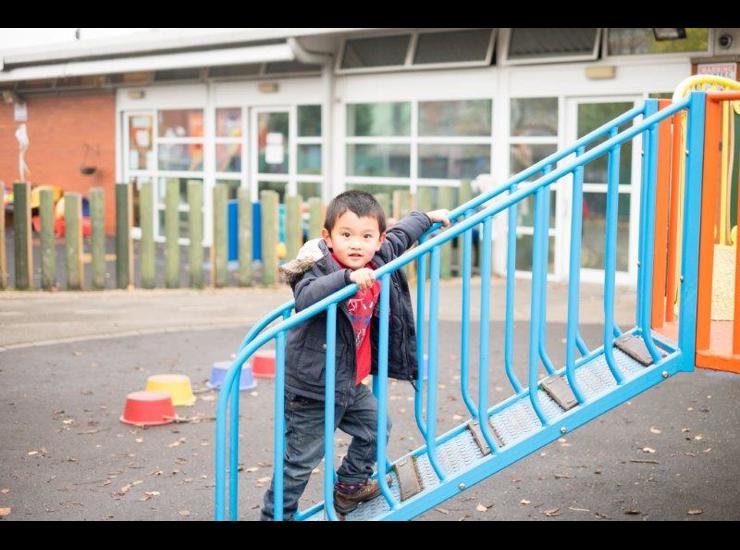
I was extremely grateful for the opportunity to complete a six-week internship at the University of Manchester's LuCiD Child Study Centre. I gained a deeper understanding of how research in child language acquisition is conducted and what it is like to work as part of a research team. I was supervised by Prof. Anna Theakston and assisted on various projects within the centre; however, most of my time was spent contributing towards two exciting projects. Firstly, I created stimuli for a follow up study in The role of visual preferences in later language learning. Secondly, I transcribed and coded audio files to later be analysed by researchers investigating the acquisition of tag questions.
Preparing animations for The role of visual preferences in later language learning.
When working on the role of visual preferences in later language learning project, I created stimuli using AnimeStudioPro. The experiment is a follow up study on 2-year-olds to investigate whether they can learn to associate verbal labels with actions the mechanisms involved in this process. I prepared 45 short video clips (10 seconds). Each clip contained two different animal characters performing an action from a range of 10 animal characters. One acted as the agent and the other as the patient.
I worked autonomously to manipulate existing stimuli from the previous study and to design and animate new stimuli. I manipulated the stimuli to fit precise time-frames which complied with the experimental design; I had to exactly match timing, degree and location of all movements across different stimuli. When completed, the clips involved one of the characters (the agent) performing an action (a novel verb) on the other (the patient); an eye tracker will determine whether the child can match the spoken verb to the action being performed on screen.
During the experiment, participants will first be presented a simple event; the agent approaches the patient and causes them to physically move- the active agent is ‘doing something’ to an inactive patient. The video clips will be accompanied with recorded spoken sentences (audio cue). The sentences will include a novel verb ‘Look the cow is meeking the pig’; the use of a novel verb allows us to measure the child’s ability to learn new verbs as opposed to using their existing knowledge, these will be played a few times to familiarise the child with the verb. In the experimental phase, two different clips will be shown side by side along with the audio cue ‘Look the frog is meeking the duck’, in one clip, the action just shown (target) e.g. ‘meeking’ will be presented along with another action e.g. ‘dacking’.
Different combinations of characters will perform each action; this is so that the action is performed independent of individual characters on separate occasions. If the child has interpreted the verbal label correctly and can map the spoken verb onto the visual representation of the verb in animated clips, then they will focus their attention on the clip where the target action is taking place, irrespective of who is performing it. On the other hand, the child may incorrectly think that the action must have something to do with one or more of the specific characters they saw when they first heard the word, in this case they will look to the other scene. Where the child looks will indicate whether they can understand and abstract verbal labels. An eye tracker will be used to monitor where the child is looking.
Transcription for Tag Questions project
I also worked on a project under the communication theme for the acquisition of Tag Questions. I transcribed and coded audio files using CLAN software to contribute to dense corpus data, this will be analysed to complement experimental studies on Tag Questions. The sound files were of a child and their caregiver and were recoded over a period of two years and were naturalistic interactions.
Tag Questions pose many problems for children who are learning to speak; children make number of errors for example auxiliary and pronoun matching errors such as ‘I like ice-cream, doesn’t me’ as opposed to ‘I like ice cream, don’t I’. There is limited research on how children’s input relates to their acquisition of tags. Researchers are working to determine the development window where children stop making these errors and are also investigating the reasons these errors occur. By transcribing and coding caregiver-child interactions, researchers are provided with a basis for identifying patterns in children’s communicative development and from this, can determine how caregiver input shapes children’s speech.
What I'll take from my internship experience
I was extremely keen to have a proactive role within a real research environment to supplement my experience in undergraduate lab classes. I applied for this exciting opportunity because I hope to achieve a Doctorate in Educational Psychology after completing my BSc Psychology Degree. There were many aspects of children’s language acquisition that interested me during my second-year modules and I became aware of the importance of children’s language ability, as this is a key predictor of future academic success and other life outcomes related to mental health and wellbeing and socioeconomic status. Having played an active role as part of a research team which aims to combat these problems through innovative research, has been extremely rewarding.
My time working at the LuCiD Child Study Centre in Manchester has been thoroughly enriching; I have broadened my skill set and deepened my understanding of how research is conducted beyond Undergraduate level. I have also been privileged enough to attend lab meetings, reading groups and seminars with academics. This has allowed me to witness stimulating discussions about advanced research projects; I now have a deeper understanding of how research is conducted. This experience has strengthened my desire to complete a Doctorate and to conduct research at a higher level.

